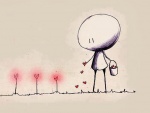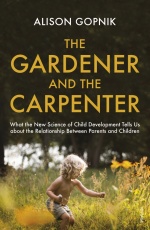Modern Parents: Carpenter vs Gardener
January 13, 2018
Quote of the Week
"Free the child's potential, and you will transform him into the world." -- Maria Montessori
Modern Parents: Carpenter Vs Gardener
 "In her new book, The Gardener and the Carpenter, Alison Gopnik launches a manifesto “against parenting”, a noun she points out first emerged only in 1958, according to the Merriam-Webster dictionary. “Parenting is a terrible invention. It hasn’t improved the lives of children and parents, and in some ways it’s arguably made them worse. It’s made relationships more intense, particularly in this latest generation of parents and children. The time that they are together is much more fraught and unhappy and guilt-ridden than it should be.”
"In her new book, The Gardener and the Carpenter, Alison Gopnik launches a manifesto “against parenting”, a noun she points out first emerged only in 1958, according to the Merriam-Webster dictionary. “Parenting is a terrible invention. It hasn’t improved the lives of children and parents, and in some ways it’s arguably made them worse. It’s made relationships more intense, particularly in this latest generation of parents and children. The time that they are together is much more fraught and unhappy and guilt-ridden than it should be.”
She thinks older, middle-class mothers and father have turned parenting into an occupation to match the jobs they did before having children. This makes them hungry for results they can measure, like the degrees they notched up while studying. “One reason why the parenting phenomenon emerged in the twentieth century was because really for the first time in history people were off trying to be parents on their own who had never taken care of children but who had gone to school and worked, so therefore they think, 'OK, this is like another class I take at school.’”
Cue frustration when babies and small children turn out to be unpredictable. “You don’t know what your children are going to be like, and you can’t control what you’re going to be like as a parent. That’s kind of terrifying in a world where we are used to knowing how things are going to turn out.” This week's feature offers reflections on two ways to approach being a parent and where each of these paths will lead. [read article] In addition to the article, you may also enjoy listening to this NPR podcast featuring Gopnik. [listen online / download podcast]
Reading Corner
 Title: The Gardener and the Carpenter
Title: The Gardener and the Carpenter
By: Alison Gopnik
Stage: Any
Why? "I loved this book which shows how being a parent has changed over the years, what we have learned from studies, and how caretakers and their young ones can best take advantage of what we now know. Essentially, we can stop the constant teaching, shaping, pushing children (carpenters) and allow them to explore, thrive and interact in a safe environment (gardeners). This seems enormously freeing not to be responsible for the fairly recent overwrought,angst-filled drive to PARENT the kids. I especially liked Gopnik's perspective as a grandmother and their importance historically, biologically and their relevancy still today for healthy development. [...] I just found this a very hope filled book." -- Perri, GoodReads
Be the Change
Tune into an interaction with your child(ren) when you find yourself being a carpenter, trying to shape your child in even the smallest of ways. Take a moment to pause and reflect on how you might transform the interaction as if you were a gardener. How did the interaction unfold?





